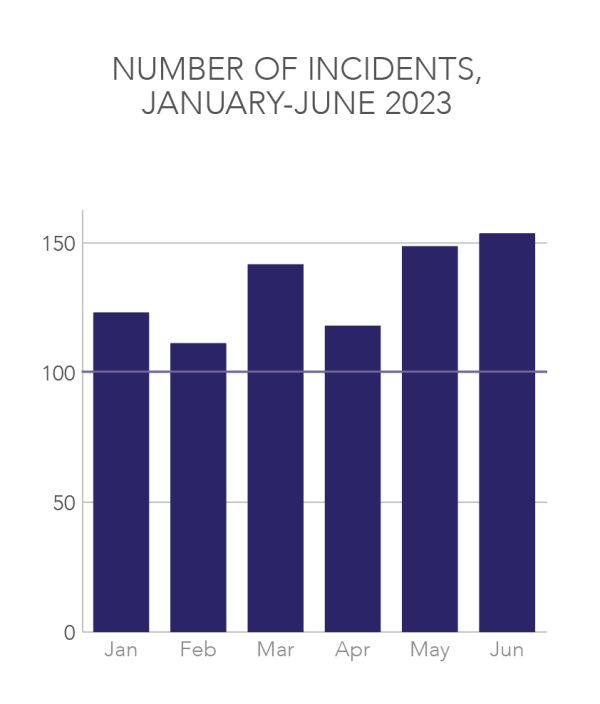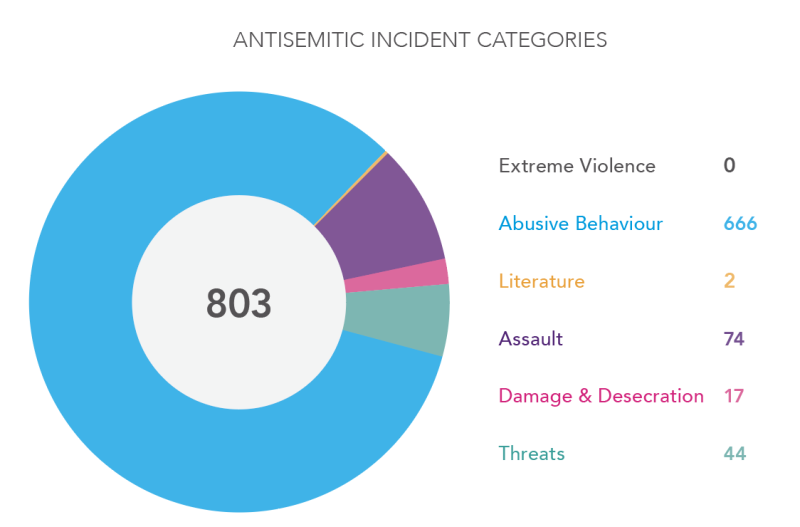CST Blog
Antisemitic Incidents Report January-June 2023
3 August 2023
CST’s Antisemitic Incidents Report January-June 2023, published today, shows 803 instances of anti-Jewish hate recorded across the UK in the first six months of this year. This is a 2% decrease from the 823 incidents reported in the first half of 2022, and is the sixth-highest total ever recorded by CST in the January to June period. CST recorded 1,371 antisemitic incidents in the first six months of 2021, 875 in the first half of 2020, and 911 between January and June 2019.
A further 328 potential incidents were reported to CST that are not included among the report’s statistics as, upon further investigation, they did not evidence antisemitic language, motivation or targeting. Many of these potential incidents involve suspicious activity or possible hostile reconnaissance at Jewish locations, and they play an important role in informing CST’s provision of protection to the Jewish community.

Over 100 antisemitic incidents were recorded in each of the first six months of the year. This is the second consecutive year in which this has occurred, and the sixth year in the last seven. The substantial level of reports in 2023 is not a consequence of any single trigger event, but is simply consistent with the high reporting averages that have become typical. Between January 2006 and March 2016, the monthly total only exceeded 100 incidents on six occasions, usually coinciding with escalation of conflict in the Middle East.
The total of 803 incidents includes 210 occasions – 26% of the overall six-monthly figure – where the abuse occurred online. This is an increase of 37% from the 153 online incidents recorded in the first half of 2022, which constituted 19% of that year’s January-to-June total. It is the fifth-highest number of online incidents reported to CST in the first six months of a year, a striking rise in volume and proportion from the corresponding period in 2022.
The 79% upswing in reports of incidents on Twitter explains this, increasing from 75 between January and June 2022 to 134 in the first half of 2023. It coincides with the platform’s change in ownership and approach to the moderation of hateful content: less material is removed now, but its accessibility and reach are supposed to be restricted. CST only logs online incidents if they have been reported to CST by the victim or a witness, and if either the victim or the offender is based in the UK. Therefore, these figures are a reflection of the amount of antisemitism that Jewish people in the UK are seeing and reporting to CST, rather than an overall quantitative estimate, suggesting that Twitter’s new strategy is not working. Of the 134 antisemitic incidents hosted on Twitter, 96% showed at least one extremist or conspiracist discourse or motivation, compared to 62% of incidents that took place on other online platforms.
Incidents affecting the school sector rose by 29%, from 52 in the first half of 2022 to 67 between January and June 2023. Many of these incidents are counted among the 103 instances in which the offender was under the age of 18 – 25% of the 415 incidents wherein CST received a description of the perpetrators’ age. This is the highest proportion of child offenders reported in the first six months of any year since 2015 (when 33% of offenders were described as minors where CST obtained a description of their age). This concerning trend has curved upwards since the first half of 2020, when 9% of offenders were described to CST as minors, rising to 15% in the first six months of 2021, and 22% from January to June 2022.
In a similar vein, victims were children in 88 incidents in the first half of 2023, 20% of the 451 cases where CST obtained a description of the victim’s age. A further 28 incidents (6%) targeted mixed groups of adults and children, meaning that minors were amongst the victims in over a quarter of all antisemitic incidents where CST obtained an age description, the highest half-year proportion recorded since January to June 2016. While the percentages of child offenders and victims initially rose in the context of antisemitic reactions to Israel’s war with Hamas in May and June 2021, this persistent strain of increased anti-Jewish hate among young people appears to run deeper than a desire to direct anti-Israel feeling at Jewish people. Fifty per cent of incidents perpetrated by minors showed evidence of at least one political, religious, or racist rhetoric, conspiracy theory or ideology. The most common of these discourses made reference to Hitler, the Nazis, the Holocaust, or used discourse and imagery associated with that period in history.
This was the most common discourse observed in all cases of anti-Jewish hate reported between January and June 2023, present in 247 of the 445 incidents that exhibited at least one political, religious, or ideological discourse or motivation. In 135 incidents, the offender used rhetoric or iconography related to Israel, Palestine and the Middle East alongside antisemitic language or targeting. Antisemitic conspiracy theories were employed in 85 of the incidents recorded by CST, 79 of which alleged Jewish influence over global politics, media, finance and other areas of life. Multiple different strands of antisemitic narrative were included in 60 incidents, demonstrating that offensive, hateful language and themes are not always tied to specific, coherent ideologies.

CST recorded 74 antisemitic incidents in the category of Assault from January to June 2023, 9% of the 803 total. None of these incidents were severe enough to be classed as Extreme Violence (which would involve Grievous Bodily Harm or a threat to life). There were 17 cases of Damage & Desecration of Jewish property reported in the first half of 2023; 44 direct antisemitic Threats; 666 instances of Abusive Behaviour, a category including verbal abuse, antisemitic graffiti on non-Jewish property, online antisemitic abuse and one-off examples of hate mail; and two reports of mass-produced antisemitic Literature.
CST recorded 447 antisemitic incidents in Greater London, a fall of 4% from the 468 incidents reported in London in the first half of 2023. Meanwhile, there were 132 antisemitic incidents recorded in Greater Manchester, an increase of 29% from the 102 such incidents in the same timeframe in 2022. Elsewhere, there were 11 antisemitic incidents in Leeds, nine in Gateshead, nine in Liverpool, eight in Birmingham, eight in Borehamwood & Elstree and eight in Brighton & Hove. CST recorded an antisemitic incident in all but eight Police regions across the country.
Read the full Antisemitic Incidents Report January-June 2023.
CST Chief Executive Mark Gardner said:
“Every single month, British Jews are reporting over 100 antisemitic hate incidents to CST. It shows the base level of anti-Jewish hatred, but it also shows the importance of the tone and policies that are set by leaders and influencers. We experienced it in every year of Jeremy Corbyn’s leadership of the Labour Party, and now, from a totally different direction, we see the exact same thing happening because of recent changes at Twitter.”
HM Government’s Independent Adviser on Antisemitism Lord Mann said:
“CST is recognised across government and policing as the reliable source of evidence about the nature and scale of antisemitism across the country. Anyone who thinks the issue has gone away needs to read this report and see how antisemitism manages to persist and find new outlets to threaten, abuse and harm Jewish citizens of all ages. The cooperation between government, criminal justice and the CST remains the cornerstone of how we monitor and challenge antisemitism and the good news is that there is a consensus across Parliament about this being a high and continuous priority.”
DCC Mark Hamilton, the National Policing Lead for hate crime said;
"The police service takes great value from the comprehensive data collated by our partners at the Community Security Trust. We share a determination to protect our Jewish communities from antisemitic crime and this data, alongside our own crime records, helps us to better understand the nature of crime and identify what measures are needed to reduce the harm they cause.
Whilst any annual reduction in hate crime is welcomed, we can't be satisfied, as these figures remain very high in historical comparisons. Whilst we want to see these figures reduce, that can not be at the expense of under-reporting and I urge every victim to report their crimes to the CST or the police directly."
Read More

Antisemitic Incidents Report January-June 2025
6 August 2025

Love since 7 October
14 February 2025

Antisemitic Incidents Report 2024
12 February 2025